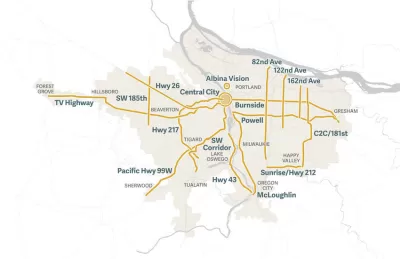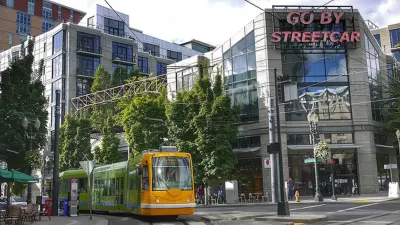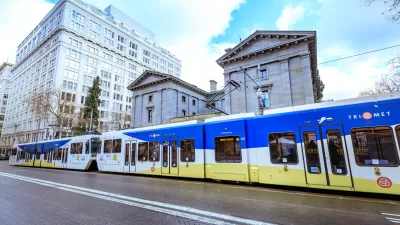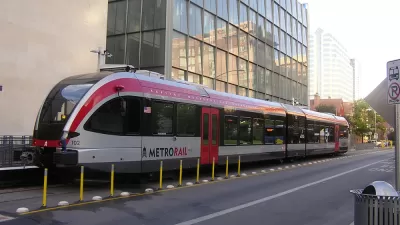The Get Moving 2020 transportation plan will face voters in thee Portland, Oregon region in November.

In July, the Metro Council, the regional planning organization for the Portland, Oregon area, finalized a historic ballot measure for consideration by voters in November. The "Get Moving 2020" plan requires voters to approve a $7 billion bond to fund safety, transit, and other transportation projects in Multnomah, Washington, and Clackamas counties.
"Among other investments, the measure would extend the MAX from downtown Portland to Tualatin, connect a regional rapid bus network, repair and replace bridges, complete sidewalks and pedestrian crossings on major roads, and upgrade thousands of traffic signals and streetlights," reported Chris McGinness back in July.
The bond would be financed with a new .75 percent payroll tax on businesses that the Metro Council claims will only apply to 10 percent of businesses in the region, with an exception for small businesses. That tax provoked opposition to the measure from the Portland Business Alliance, according to McGinnis.
The Metro Council has created a website to provide more information on the expenditure plan and governance of the proposed bond. Here's how that website summarizes the Get Moving 2020 plan:
If the proposed measure passes, 17 primary travel routes, known as corridors, are proposed for projects. Approximately 150 total projects are proposed in these corridors. If the measure passes, proposed corridor projects would include a light rail line in the Southwest Corridor between downtown Portland and Washington County, a rapid regional bus network, bridge replacement and repair, sidewalks and pedestrian crossings, off-street biking and walking facilities, and traffic signal and intersection upgrades.
The website includes additional projects and programs that will be funded by the Get Moving 2020 plan, like bus and MAX passes for youth, safe active transportation projects near schools, and the transition of buses from diesel to electric and low-carbon fuels.
FULL STORY: Metro sends historic bond to the November ballot

Maui's Vacation Rental Debate Turns Ugly
Verbal attacks, misinformation campaigns and fistfights plague a high-stakes debate to convert thousands of vacation rentals into long-term housing.

Planetizen Federal Action Tracker
A weekly monitor of how Trump’s orders and actions are impacting planners and planning in America.

In Urban Planning, AI Prompting Could be the New Design Thinking
Creativity has long been key to great urban design. What if we see AI as our new creative partner?

King County Supportive Housing Program Offers Hope for Unhoused Residents
The county is taking a ‘Housing First’ approach that prioritizes getting people into housing, then offering wraparound supportive services.

Researchers Use AI to Get Clearer Picture of US Housing
Analysts are using artificial intelligence to supercharge their research by allowing them to comb through data faster. Though these AI tools can be error prone, they save time and housing researchers are optimistic about the future.

Making Shared Micromobility More Inclusive
Cities and shared mobility system operators can do more to include people with disabilities in planning and operations, per a new report.
Urban Design for Planners 1: Software Tools
This six-course series explores essential urban design concepts using open source software and equips planners with the tools they need to participate fully in the urban design process.
Planning for Universal Design
Learn the tools for implementing Universal Design in planning regulations.
planning NEXT
Appalachian Highlands Housing Partners
Mpact (founded as Rail~Volution)
City of Camden Redevelopment Agency
City of Astoria
City of Portland
City of Laramie





























